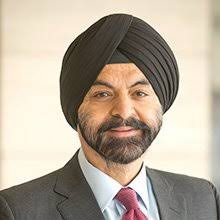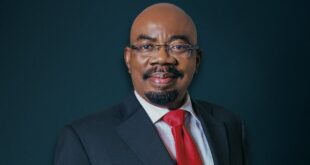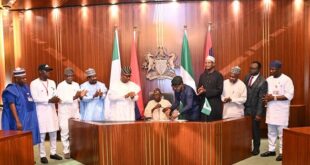The International Monetary Fund (IMF) has commended the Central Bank of Nigeria’s decision to remove restrictions on 43 items previously restricted from accessing foreign exchange at the official window.
The IMF also acknowledged that the newly appointed officials under President Bola Tinubu have initiated a series of reforms aimed at delivering favourable outcomes for Nigerians. It however, noted that the reforms may require time to achieve the desired results.
The International Monetary Fund (IMF) has commended the Central Bank of Nigeria’s decision to remove restrictions on 43 items previously restricted from accessing foreign exchange at the official window.
The IMF also acknowledged that the newly appointed officials under President Bola Tinubu have initiated a series of reforms aimed at delivering favourable outcomes for Nigerians. It however, noted that the reforms may require time to achieve the desired results.
Also, in a speech he presented at the ongoing World Bank and the IMF meetings, the World Bank President, Ajay Banga, praised the ingenuity of Nigerian entrepreneurs, saying that he feels their yearnings to contribute to the growth of society.
The Director of the African Department, IMF, Abebe Aemro Selassie, on Friday unveiled IMF’s approval of Nigeria’s decision to remove forex restrictions on the 43 items, during a media briefing on the Regional Economic Outlook for Sub-Saharan Africa in Marrakech, Morocco, at the ongoing IMF/World Bank Annual meetings.
Selassie, also harped on the need to enhance tax reforms so as to improve revenue generation, create more fiscal space and reduce its burden of servicing and acquiring debts.
On the trade restrictions, he said, “The view of the IMF is that Nigeria and many other economies are so sophisticated and complex, that I don’t think that these kinds of restrictions work.
“The best way to manage a modern economy is to have fiscal policy lever and monetary policy lever to use to affect the kind of policy outcome you want, rather than saying I don’t like these goods and so I don’t want it to come in, etc, that tends to create an unhelpful distortion.
“Of course, there are tax policies you can also use if you really want to be against certain types of imports. In general, I think the direction the CBN has moved is a helpful one.”
Furthermore, responding to a THISDAY question, Selassie said Nigeria’s debt was sustainable, just as he said the country was not in talks with the IMF on debt restructuring.
Selassie said: “I am not aware of any debt discussions that are going on, debt profiling or debt restructuring in Nigeria. In Nigeria, the most important cause of the pressures is the fact that the government does not generate enough tax revenue for all the services it needs to provide.
“Interest payment as a share of revenue is very high and does not leave much room to spend on other issues, that is the key issue that needs to be worked on.
“While there is not enough tax revenue, I think in the past reliance on oil when prices were high and secondly the subsidy regime which also implies and entails lots of government resources being directed where they should not be.
“These are all interlinked issues including causing some of the inflation that you have and the difficulty to tap into the international capital market. That is why the government has had to rely more on domestic financing which of course has crowded out the private sector and put constraints on monetary injections which has weakened the exchange rate.”
He noted that Nigeria has “incredible potential and we have seen reforms moving in the right direction in recent months.
He said: “What is needed, we feel, is making the reforms holistic and help reinforce each other (monetary and fiscal policy).
“Just as things were not reinforcing each other in the past, there is scope to make the reforms reinforce each other. So, the exchange rate reforms that the government did were very welcome in trying to unify the rates.
“Similarly, the fuel subsidy will not help or stick unless they tighten monetary policy and also you are doing something to mobilise more tax revenue.
“So, a holistic package of reforms is what is needed and we have to give a bit of time to the new administration also.
“The CBN governor has just been appointed, and the minister of finance has only been appointed a few weeks. So, we are hopeful that they will move in the right direction and we stand to provide every policy advice that the government needs.”
On Nigeria’s debt level, he added that it was manageable.
He said: “So the assessment of debts should not be based on the nominal value of a debt stock but on how it relates to many other economic variables.”
Regarding monetary policy coordination, he added that it was important to emphasise that addressing the exchange rate gap required more than just necessary adjustments and corrections.
He stressed that it must be complemented by the implementation of stricter monetary policy conditions.
The CBN had on Thursday, declared that importers of 43 items previously restricted from accessing foreign exchange (FX) at the official window were now allowed to purchase FX in the Nigerian foreign exchange market going forward.
The apex bank in June 2015, had initially included 41 items to the list of commodities which were not-valid to purchase FX from the market, citing the need to conserve the scarce forex and encourage domestic production for self-sufficiency and exports. The list was thereafter expanded to 43 items.
Some of the items listed then as not-fit-for forex included rice, cement, margarine, palm kernel products and vegetable oil, meat and processed meat products, vegetables and processed vegetable products, poultry chicken, private airplanes, tinned fish in sauce, roofing sheets wheelbarrows, head pans, among others.
Ajay Banga to Nigerian Entrepreneurs: I Feel Your Yearnings
The World Bank President, Ajay Banga, yesterday, in a speech he presented at the ongoing meetings of the bank and the IMF in Morocco praised the ingenuity of Nigerian entrepreneurs, saying that he feels their yearnings to contribute to the growth of society.
He also spoke about challenges the world was facing and the contribution of developed countries, emerging markets and low-income nations.
He explained: “Looking across the world it is easy to be consumed by a sense of despair. Yet – in all corners of the globe, people are eager to go to work, and to create with their own hands. They want a better life for their children and grandchildren.
“I have felt that yearning among entrepreneurs in Nigeria, seen it in the proud eyes of artists in Indonesia, and touched it on the worn hands of farmers in Jamaica.”
He noted that the bank “has an obligation – a duty – to match their energy with a fierce determination”, adding, “we must be the hand on the back – moving people forward. We must be an institution that exports optimism and impact.
“But we must change to make good on that promise and deliver on what is being demanded. The World Bank is turning to face the wind.
“That evolution began months ago, and today there is a new vision and mission for the World Bank. To create a world free of poverty – on a liveable planet.”
Banga also pointed out that Nigerians were among millions of people doing their best to be part of the solution.
He said the multilateral institutions were faced with “declining progress in our fight against poverty, an existential climate crisis, food insecurity, fragility, a fledgling pandemic recovery, and are feeling the effects of conflicts beyond the front.”
He added: “Economic growth in much of the developing world is retreating. Falling from six percent to five percent in two decades, and on track for just four percent over the next seven years.
“With each lost percent, 100 million people are pulled into poverty and another 50 million people are pushed into extreme poverty.
“Dig deeper and you’ll find people struggling to provide for themselves and their families as incomes have stagnated. In Sub-Saharan Africa per capita income is the same as it was 14 years ago.
“Meanwhile, debt has increased throughout emerging markets – doubling in Africa – shackling countries to the ground just as they’re trying to rise.
“We are living in a world with alarming challenges but at a time of intensifying polarisation and extremes.
“Beneath the surface, a growing mistrust is pulling the Global North and South apart, complicating the prospect of progress.
“The Global South’s frustration is understandable. In many ways they are paying the price for the prosperity of others.
“When they should be ascendant, they’re concerned that promised resources will never manifest, they feel energy rules aren’t applied universally, and they’re worried a burgeoning generation will be locked into a prison of poverty.”
According to the World Bank chief, “we must find a way to finance a different world where our climate is protected, pandemics are manageable – if not preventable – food is abundant, and fragility and poverty are defeated.”
 The Commerce Africa African Reneissance
The Commerce Africa African Reneissance




